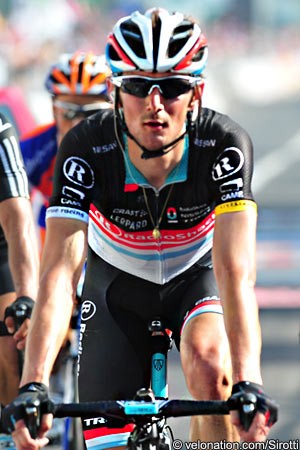RadioShack-Leopard rider “disappointed” with “severe” punishment; set to miss Tour de France
 Fränk Schleck (RadioShack-Leopard) has been handed a one-year ban by the Luxembourg Anti-Doping Agency (ALAD) as a result of his positive test for the banned diuretic Xipamide during last year’s Tour de France. The Luxembourg rider returned the positive sample in an in-competition test on July 14, following the 13th stage of the Tour de France; the result was returned on July 17th and he did not start the following day.
Fränk Schleck (RadioShack-Leopard) has been handed a one-year ban by the Luxembourg Anti-Doping Agency (ALAD) as a result of his positive test for the banned diuretic Xipamide during last year’s Tour de France. The Luxembourg rider returned the positive sample in an in-competition test on July 14, following the 13th stage of the Tour de France; the result was returned on July 17th and he did not start the following day.
Schleck has consistently denied knowingly ingested the substance, which is classified as a “specified substance’ by the World Anti-Doping Agency (WADA). This classification means that it can carry a lighter sentence than the standard two-year suspension generally handed out for drugs like EPO, and did not mean that he was automatically required to leave the race.
ALAD noted that Schleck had not ingested the substance intentionally, and also noted that the analysis of hair samples taken from the rider indicated no evidence of doping. Schleck’s biological passport was also regarded as normal but, due to the rule of strict liability handed the former Luxembourg champion a reduced one-year ban.
Schleck’s suspension has been backdated to July 14th, the date that he supplied the positive sample, which means that he will not be able to start this year’s Tour de France.
The rider himself is far from happy with the decision, and hints that he may appeal.
“Of course I am disappointed by the verdict that has just been announced,” said the 32-year-old in a statement. I think that the decision to suspend me during one year is too severe considering the fact that the Council [ALAD] acknowledged that I unintentionally consumed a contaminated product. Unfortunately the provisions of the UCI are such that an involuntary contamination is sufficient in order to pronounce a punishment.
“However I am relieved that the judges acknowledged that the present is not a case of doping and that I had no intention to enhance my performance. This is very important for me, my family, for my team and all those who support me.
“We will now analyse the decision in detail and decide on potential further steps,” he added. “However I bear a positive aspect of the decision in mind: the judges acknowledged that I am not a cheater.
“I wish to thank all my friends and fans who kept their faith in me during this tough period.”
Schleck’s team, RadioShack-Leopard, has yet to make a decision on how to act on the news, having named the rider as part of its 2013 roster. Normally a positive dope test would result in the automatic firing of a rider, but the verdict of accidental contamination means that this may not necessarily happen.
“The Management of Leopard S.A. has taken note of the verdict of the CDD (Conseil de Discipline contre le Dopage) in the case of Fränk Schleck's positive test for xipamide during the 2012 Tour de France,” the team’s statement reads.
“Leopard S.A. is content that the anti-doping authorities have now reached a verdict, but will not make any further declarations about the case until it has studied the argumentation of the CDD more closely.”
Schleck, the International Cycling Union (UCI), and the World Anti-Doping Agency (WADA) all have the right to appeal the decision to the Court for Arbitration in Sport (CAS) if they feel it is either too severe or too light.